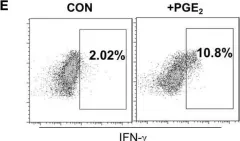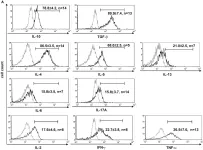Therapeutic monoclonal antibodies (mAbs) can be functionally enhanced via Fc engineering. To determine whether pairs of mAbs with different Fc modifications can be combined for functional complementarity, we investigated the in vitro activity of two HIV-1 mAb libraries, each equipped with 60 engineered Fc variants. Our findings demonstrate that the impact of Fc engineering on Fc functionality is dependent on the specific Fab clone. Notably, combinations of Fc variants of the same Fab specificity exhibited limited enhancement in functional breadth compared to combinations involving two distinct Fabs. This suggests that the strategic selection of complementary Fc modifications can enhance both functional activity and breadth. Furthermore, while some combinations of Fc variants displayed additive functional effects, others were detrimental, suggesting that the functional outcome of Fc mutations is not easily predicted. Collectively, these results provide preliminary evidence supporting the potential of complementary Fc modifications in mAb combinations. Future studies will be essential to identify the optimal Fc modifications that maximize in vivo efficacy.
Product Citations: 172
Combinatorial Fc modifications for complementary antibody functionality.
In MAbs on 1 December 2025 by Bartsch, Y. C., Webb, N. E., et al.
In IScience on 18 April 2025 by Moore, A. E., Nault, H., et al.
We describe a series of DAP12-associated receptors that can be used to achieve multi-targeting within a small genetic payload. Empirical evaluation of scaffold/binder combinations is required to define the optimal synthetic receptor configuration. When two DAP12-associated synthetic receptors were expressed in T cells from a single vector, the surface levels of individual receptors was reduced when compared to T cells engineered with vectors that express a single receptor. The reduction in receptor expression had a pronounced effect on early, but not late, signaling events and primarily affected cytokine production. The functional deficiency was overcome by increasing synthetic receptor levels demonstrating that there is no fundamental issue related to co-expression of multiple DAP12-associated synthetic receptors in a single T cell. Our data show that T cells can be engineered with multiple recombinant DAP12-based receptors to yield multi-target specific T cells, however, thoughtful design and optimization are necessary.
© 2025 The Author(s).
-
Genetics
-
Immunology and Microbiology
In Nature Immunology on 1 April 2025 by Rea, A., Santana-Hernández, S., et al.
Transforming growth factor beta (TGFβ) and activin A suppress natural killer (NK) cell function and proliferation, limiting the efficacy of adoptive NK cell therapies. Inspired by the partial resistance to TGFβ of NK cells with SMAD4 haploinsufficiency, we used CRISPR-Cas9 for knockout of SMAD4 in human NK cells. Here we show that SMAD4KO NK cells were resistant to TGFβ and activin A inhibition, retaining their cytotoxicity, cytokine secretion and interleukin-2/interleukin-15-driven proliferation. They showed enhanced tumor penetration and tumor growth control, both as monotherapy and in combination with tumor-targeted therapeutic antibodies. Notably, SMAD4KO NK cells outperformed control NK cells treated with a TGFβ inhibitor, underscoring the benefit of maintaining SMAD4-independent TGFβ signaling. SMAD4KO conferred TGFβ resistance across diverse NK cell platforms, including CD19-CAR NK cells, stem cell-derived NK cells and ADAPT-NK cells. These findings position SMAD4 knockout as a versatile and compelling strategy to enhance NK cell antitumor activity, providing a new avenue for improving NK cell-based cancer immunotherapies.
© 2025. The Author(s).
-
Immunology and Microbiology
In Molecular Therapy. Methods Clinical Development on 13 March 2025 by Hsieh, H. J., Urak, R., et al.
Phosphatidylinositol 3-kinase (PI3K)/protein kinase B (AKT) signaling is involved in the growth of normal and cancer cells and is crucial for T cell activation. Previously, we have shown that AKT Inhibitor VIII, a selective AKT-1/2 inhibitor, during chimeric antigen receptor (CAR) T cell manufacturing, improves CAR T cell function in preclinical models. Although AKT Inhibitor VIII could enhance CAR T cell function, AKT Inhibitor VIII is not a clinical-grade compound. However, pan-AKT inhibitors have been applied against cancers with PIK3CA/AKT/PTEN alterations in clinical trials. We evaluated ex vivo and in vivo strategies of enhancing CAR T cell therapeutic effect using the pan-AKT inhibitor capivasertib. We found that ex vivo 0.25 μM capivasertib treatment during the period of T cell stimulation during manufacture enhanced the antitumor activity of CAR T cells in B cell lymphoma mouse models. Mechanistically, capivasertib changed gene and protein expression patterns related to the functions of memory and effector CAR T cells. Furthermore, in vivo combination therapy of capivasertib and CD19-specific CAR T cells led to improved early response to and persistence of functional CAR T cells in mice bearing PTEN-deficient lymphoma cells compared to CAR T cells alone. Capivasertib exerts a similar function to AKT Inhibitor VIII in modulating CAR T cells, and combining CAR T cell therapy with capivasertib both ex vivo and in vivo offers the potential to improve patient outcomes. Since PTEN deficiency is common in cancer and is the main mechanism for capivasertib function, combination therapy may provide an alternative solution for the challenges of CAR T cell therapy.
© 2025 The Author(s).
-
Cancer Research
-
Immunology and Microbiology
In Nature Immunology on 1 March 2025 by Zhu, A., Chen, Z., et al.
Mucosal antigen-specific T cells are pivotal for pathogen clearance and immune modulation in respiratory infections. Dysregulated T cell responses exacerbate coronavirus disease 2019 severity, marked by cytokine storms and respiratory failure. Despite extensive description in peripheral blood, the characteristics of severe acute respiratory syndrome coronavirus 2 (SARS-CoV-2)-specific T cells in the lungs remain elusive. Here we conducted integrated single-cell profiling of SARS-CoV-2-specific T cells in 122 bronchoalveolar lavage fluid (BALF) and 280 blood samples from 159 patients, including 27 paired BALF and blood samples from 24 patients. SARS-CoV-2-specific T cells were robustly elicited in BALF irrespective of prior vaccination, correlating with diminished viral loads, lessened systemic inflammation and improved respiratory function. SARS-CoV-2-specific T cells in BALF exhibited profound activation, along with proliferative and multi-cytokine-producing capabilities and a glycolysis-driven metabolic signature, which were distinct from those observed in peripheral blood mononuclear cells. After viral clearance, these specific T cells maintained a polyfunctional tissue-resident memory phenotype, highlighting their critical roles in infection control and long-term protection.
© 2025. The Author(s).
-
COVID-19
-
Immunology and Microbiology
In Front Immunol on 25 August 2018 by Park, A., Lee, Y., et al.
Fig.6.E

-
FC/FACS
-
Collected and cropped from Front Immunol by CiteAb, provided under a CC-BY license
Image 1 of 4
In Front Immunol on 25 February 2015 by Ziegler, H., Welker, C., et al.
Fig.3.A

-
FC/FACS
-
Homo sapiens (Human)
Collected and cropped from Front Immunol by CiteAb, provided under a CC-BY license
Image 1 of 4
In Front Immunol on 25 February 2015 by Ziegler, H., Welker, C., et al.
Fig.5.D

-
FC/FACS
-
Homo sapiens (Human)
Collected and cropped from Front Immunol by CiteAb, provided under a CC-BY license
Image 1 of 4
In PLoS One on 8 August 2012 by Arroyo-Villa, I., Bautista-Caro, M. B., et al.
Fig.2.A

-
FC/FACS
-
Collected and cropped from PLoS One by CiteAb, provided under a CC-BY license
Image 1 of 4



